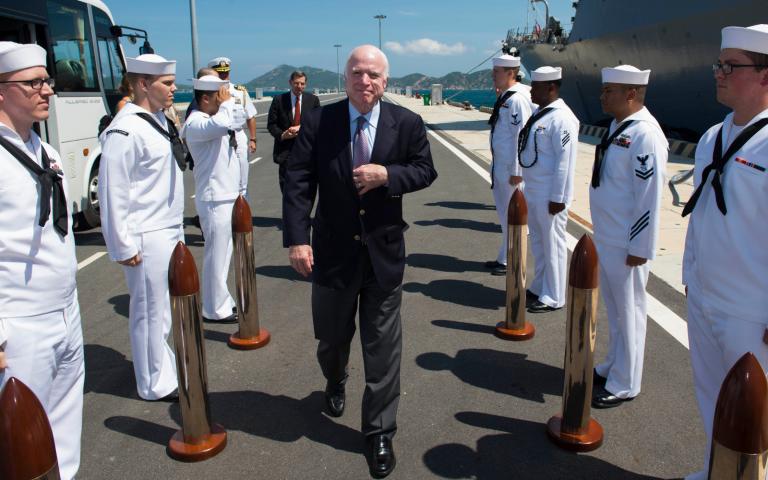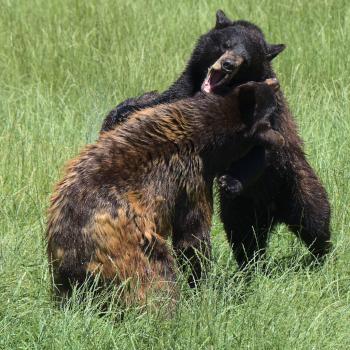I sympathize with the children of John McCain. It has been less than a year since my own father died; their grief resonates with mine. I wish them peace.
But my father was a private citizen. If those who spoke about him after his death were overly charitable (I don’t think so, but I can consider the possibility), there is no impact on public policy.
John McCain, however, was a long-time US Senator, a political celebrity who by his own admission was less interested in reforming or improving governance than in his own personal glorification:
“I didn’t decide to run for president to start a national crusade for the political reforms I believed in or to run a campaign as if it were some grand act of patriotism. In truth, I wanted to be president because it had become my ambition to be president…. In truth, I’d had the ambition for a long time.“
There is a common admonition to not speak ill of the dead. It may be rooted in beliefs about the power to haunt, to which I say that the truth and clarity is magic greater than any ghost possesses. (I recommend the zazen exorcism of Nanzen-ji by Fumon as an example.) We have nothing to fear if we speak truth.
Or it may be rooted in concerns about politeness and etiquette. But as you become a public person, you give up the right to control discussion about your actions. As Glenn Greenwald wrote at the death of imperialist Islamophobe and bad representative for atheism Christopher Hitchens:
When someone dies who is a public figure by virtue of their political acts…discussions of them upon death will be inherently politicized. How they are remembered is not strictly a matter of the sensitivities of their loved ones, but has substantial impact on the culture which discusses their lives. To allow significant political figures to be heralded with purely one-sided requiems — enforced by misguided…notions of private etiquette… — is not a matter of politeness; it’s deceitful and propagandistic. To exploit the sentiments of sympathy produced by death to enshrine a political figure as Great and Noble is to sanction, or at best minimize, their sins. Misapplying private death etiquette to public figures creates false history and glorifies the ignoble.
So I come not to praise John McCain, but make a long-distance dedication of a Bob Dylan song:
And I’ll watch while you’re lowered
Down to your deathbed
And I’ll stand o’er your grave
’Til I’m sure that you’re dead
Because John McCain was a Master of War. Former President Carter was quite right when he called him a warmonger. Monger, after all, comes from the Latin mango, “dealer or trader”, but going back even further we have the Greek manganon meaning “contrivance, means of enchantment”.
McCain didn’t merely sell war. He contrived to enchant the nation into it. He tried to cast the old spell, “The old Lie: ‘Dulce et decorum est / Pro patria mori.'”
(For those who don’t know the Latin or the famous poem, that’s some old Roman imperialist bullshit: “It is sweet and fitting to die for one’s country.”)
There are other reasons why we should cast a gimlet eye upon the hagiography of John McCain currently being crafted by the establishment. I hope that there will be few men in the 21st century who lie in state after calling their wife a cunt in public, and making jokes about how much women love being raped and homophobic jokes based on insulting innocent teens. (The Washington Post, one of McCain’s biggest fans, called his joke about the young Chelsea Clinton “too vile to repeat”.)
And there’s the Keating Five scandal. Rarely discussed now, the savings and loan crisis of the 1980s may be marked by future historians as the first shot fired into the body of the American middle class by the investment class.
After deregulation of the S & Ls in the early 1980’s, many of these banks began playing fast and loose with depositors’ money. When it came crashing down, taxpayers were left holding the bag for a $105 billion dollar bailout; many depositors lost their life’s savings.
And McCain was right up in it. When Lincoln Savings and Loan was being investigated by the Federal Home Loan Bank Board, their chairman, Charles Keating, had taken the precaution of giving lots of money to five US Senators — McCain among them.
So he had those Senators in his pocket intervene with regulators, keeping them off Lincoln’s back and letting the gambling roll on longer and get worse. Lincoln’s bailout cost taxpayers $2.6 billion; seventeen thousand depositors lost a total of $190 million of their life’s savings.
Keating was convicted on 73 counts of fraud in 1993, but served only 4 years in prison. A Senate “ethics” investigation let all five Senators off the hook.
And let’s not forget that McCain gave us Sarah Palin, Donald Trump’s opening act. As Mehdi Hasan points out:
…McCain introduced the loathsome Palin to the world in August 2008, when he plucked her from Alaskan obscurity and made her his running mate. In doing so, he granted prestige, influence, and credibility to a know-nothing demagogue and conspiracy theorist; a woman who thrived on racial and cultural resentment and would later become a leading figure in both the tea party and the “birther” movement. Sound familiar? Palin, as the Washington Post’s Dana Milbank wrote in 2016, was “politically, the Mother of Trump.”
But I didn’t come here to talk to you about McCain’s misogyny or homophobia or garden-variety corruption or role in destroying reasoned political discourse. I came to talk to you about the blood on his hands.
We might excuse his actions in Vietnam, even bombing civilian targets, as those of a young man conned into ceding his moral judgment to his government. We might see such young men as victims of old war-hawk politicians.
But rather than learning from the horrors of war and violence, McCain went on to become one of those old war-hawk politicians, determined to inflict them on others.
Throughout his career, anytime there was talk of bombing or invading another nation, you could bet ol’ Maverick McCain would be beating the war drums. Iran, Iraq, Libya, Afghanistan, Ukraine, Syria, North Korea, Nigeria, Mali, Kosovo, Bosnia, Sudan…the same rhythm.
When he launched his political career in the 1980s, he was on the Advisory Board of the “United States Council for World Freedom”, a right-wing anti-communist group which aided rebels trying to overthrow the elected government of Nicaragua.
McCain was a prime cheerleader for the illegal invasion of Iraq, which resulted in between half a million and a million deaths.
At one point he was happy to provide Muammar Gaddafi with military support; a few years later he later backed the insurgent hardline Islamists of the Libyan Islamic Fighting Group. His support for the insurgents helped set up the US/NATO-assisted assassination of Gaddafi, the destruction of Libya as a viable state, and the rise of ISIS in the region.
He called for more US aggression in the Syrian civil war, not caring if it led to war with Russia.
He called for US special forces to invade Nigeria to rescue girls kidnapped by Boko Haram. Not just to aid Nigeria in tracking down the bandits, something few would object to; McCain advocated violating Nigerian sovereignty with an armed invasion, an act of war — “I wouldn’t be waiting for some kind of permission from some guy named Goodluck Jonathan.”
It’s no wonder that massive arms merchant Lockheed Martin tweeted how much they would miss him: while the US currently makes up more than 50% of the entire world’s “defense” spending, McCain thought that wasn’t enough.
He was probably the military-industrial complex’s greatest champion in the United States Congress. (Not the champion of veterans, though; Disabled American Veterans gave him a rating of 20% in 2008.)
McCain famously opposed the federal holiday commemorating Martin Luther King, Jr., until that position became politically untenable. Some have seen racism in that, but I don’t think that’s the case.
I think McCain’s problem with King was that King correctly identified the United States government as the world’s greatest perpetrator of violence, while McCain was in the grip of the delusion that “The United States is the indispensable nation because we have proven to be the greatest force for good in human history.”
That delusion, that inability to see our nation for what it really is, is our tragedy. To quote Dylan again, “You don’t count the dead when God’s on your side.”
John McCain was a warmonger whose policies helped kill thousands of human beings. That our political, cultural, and media establishments are heaping praise on him, are normalizing that violence, is symptomatic of the dark rot at the heart of our nation, of our unthinking acceptance of imperialist bloodshed as the first go-to of foreign policy.


















